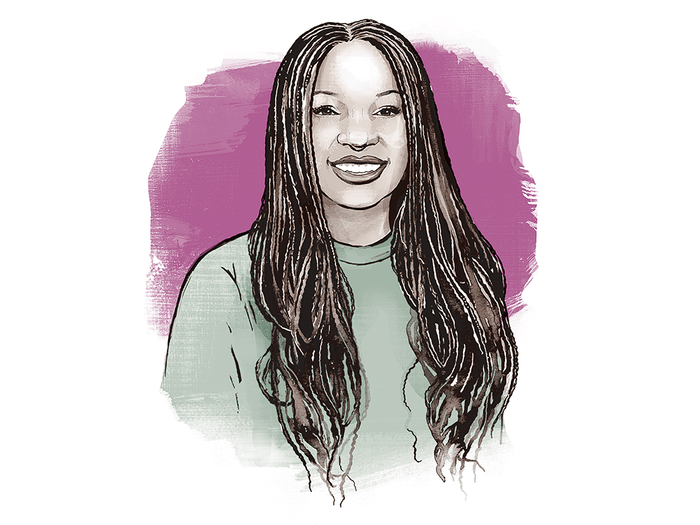How One Woman Connects to Her Culture Through Gardening

Ronke Edoho grows ingredients at her home in Saskatoon that are hard to source in Canada but are essential to her favourite Nigerian meals. Through her company, Jollof Code, she teaches you how to do the same.
This story is part of Best Health’s Preservation series, which spotlights wellness businesses and practices rooted in culture, community and history.
When Ronke Edoho moved to Canada from Nigeria more than 15 years ago, one of the first things she noticed was the fruit for sale in grocery stores. The apples were perfect, round and glistening. Sometimes they had travelled a long distance to get to the aisles of her local market in Saskatchewan. This was strange for Edoho, whose food had previously come from her grandparents’ backyard in Kwara State, Nigeria. “I always felt like I was only one step removed from my food source,” she says. But in Canada, the fruit and vegetables looked nothing like the ones she pulled out of that backyard growing up. “Everything was packaged; nothing was misshapen.”
So, in 2013, when Edoho got married and bought a home in Saskatoon, she started a backyard garden to connect with her childhood experience. She began by planting tomatoes and peppers, then moved on to ingredients that are hard to source in Canada but are essential to her favourite traditional Nigerian meals. She planted amaranth greens, a leafy vegetable that’s a staple ingredient in Nigerian dishes like efo riro, a vegetable soup cooked with palm oil. Next, she experimented with jute leaves and waterleaf, which are used in soups like ewedu and edikang ikong and eaten with pounded starches like yam or cassava.
Edoho already had a successful food blog called 9jafoodie (9ja is colloquial shorthand for Nigeria) and an active online community where she shared Nigerian recipes. So when she started posting pictures of the haul on Instagram, she was inundated with requests. “People started asking, ‘Is this something I can do for myself? Can you teach me how to do it?” says Edoho. In 2021 she launched a new website, Jollof Code, as a shop, educational resource centre and visual diary of her own gardening journey. She shares videos of how she builds her garden beds and the progress of her fruits and vegetables. And, in addition to selling seeds for Nigerian vegetables like garden egg and waterleaf, she also offers courses on how to grow those vegetables anywhere in the world.
So far, despite the challenges of growing Nigerian vegetables in chilly Canada, Edoho has been successful with her garden—but not without hard work and experimentation.
“I wanted the authentic flavour of some of those things, [so] I went into the research. Like, what is the growing season?” she says. “And then I started experimenting with different kinds of soil and watering cycles.” When she noticed that ladybugs loved to snack on her amaranth greens, for example, Edoho grew more—the insects act as a form of pest control against other, more harmful critters in her garden. For vegetables like Nsukka pepper, which thrives in the tropical weather of southeastern Nigeria, Edoho works around Saskatoon’s frigid winter and short summer by starting the seeds indoors as early as February, then transferring them outdoors when the weather warms up.
On top of learning how to grow Nigerian food, people are looking for a way to connect with home, says Edoho. “It’s not just food for nourishment. It’s a connection to a time in the past.” She uses her platform to share knowledge about specific cultural foods—knowledge that is often lost with immigration. “I feel like my generation are like city folks two generations in. A lot of people didn’t have the opportunity to grow up on a farm or around chickens or goats. I love sharing that knowledge,” she says.
Edoho also relishes the chance to share what Nigerian food is like. As a student at the University of Saskatchewan, she started blogging to dispel misconceptions about Nigerian food that media organizations in North America and Europe often present as facts: “I still remember one [article] vividly that said African food is made with poorer qualities of goat, beef and fish.” The statement shocked and annoyed her, so she decided to do something about it. “There’s a lot the West does not know about us. And our food is just one [thing],” says Edoho. “I wanted to start something to educate people about the richness of the food. My dad tells me all the time: If something is not the way you like it, either you fix it, or you keep quiet.” Luckily for fans of Nigerian food and gardening, Edoho spoke out.
This story is part of Best Health’s Preservation series, which spotlights wellness businesses and practices rooted in culture, community and history. Read more from this series here:
Meet Sisters Sage, an Indigenous Wellness Brand Reclaiming Smudging
Bone Broth from This Canadian Ayurveda-Inspired Company May Help Soothe What Ails You
Have Super Dry Skin? This Canadian Skincare Company Is Here to Help
Get more great stories delivered straight to your inbox by signing up for the Best Health Must-Reads newsletter. Subscribe here.




